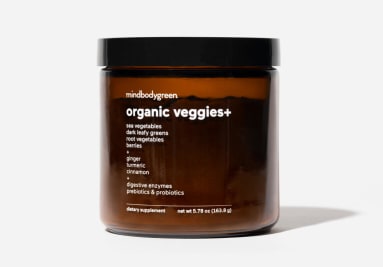What Exactly Is Inulin? + Why It Could Help Your Digestion


You may be familiar with fiber and prebiotics and the fact that they're associated with gut health. But what about inulin? The powder-like starchy substance seems obscure, but it's actually present in a lot of common food items—it just may not be labeled that way.
To give you a better understanding of what inulin is, how it can be beneficial, and how to get more into your diets, registered dietitians share their insight.
Advertisement
What is inulin?
Inulin is a dietary fiber that's naturally found in plants, registered dietitian and certified diabetes educator Shahzadi Devje, R.D., CDE, MSc, says.
More specifically, it's a prebiotic, soluble fiber, which means it digests slowly and is beneficial for gut health.
What kind of foods contain inulin?
A few common sources of inulin include chicory root, Jerusalem artichokes, onions, garlic, certain whole grains (whole wheat flour, barley, etc.), raw asparagus, leeks, and yams.
"Inulin is also added into some prepackaged foods," registered dietitian Aja Gyimah, MHSc, R.D., tells us, "like bread, snack bars, and cereal, to add more fiber." Along with adding fiber, Devje says it can be used to replace unhealthy fats and sugar in food products and can help enhance the food's texture.
Pro tip: When looking at a product's ingredient list, inulin may be listed as polysaccharides and fructooligosaccharides (FOS), which describe its sugar chains.
Advertisement
What are the benefits of inulin?
Gut health
As a prebiotic fiber, inulin helps feed the bacteria in the gut, which works to even out the good bacteria (aka probiotics) and the bad bacteria, Gyimah explains. Overall, inulin and other prebiotic fibers support gut health.
Since soluble fiber takes longer to digest, it can also help keep people fuller longer. "For some, inulin could relieve the symptoms of constipation1 by increasing the frequency of bowel movements as well as improving stool consistency," Devje tells us.
Advertisement
Immune function
"A healthy gut microbiome can improve digestion, immunity, and overall health," Devje says. "Various types of cells found in your gastrointestinal tract play a crucial role in the immune system response," she says. "TREG cells (regulate or suppress the immune system), T-cells (involved in the immune response), natural killer cells (part of adaptive immunity), and B-cells (a type of white blood cell) are all influenced by prebiotics2."
Cardiovascular health
Research shows inulin can have positive effects on overall cholesterol, LDL "bad" cholesterol, and triglyceride levels. "This benefit is because inulin decreases cholesterol absorption as it moves through your digestive tract," Devje explains. High cholesterol and triglyceride levels can increase the risks of heart disease and stroke3.
Advertisement
Metabolic health
"Metabolic syndrome is characterized by a cluster of conditions including abdominal obesity, systemic inflammation, and abnormal blood sugar and cholesterol levels," Devje says. Each of those conditions can increase the risk of heart disease, stroke, and type 2 diabetes. "Inulin has shown to help lower blood glucose and insulin levels4 after meals," she says, which may lower those risks.
How to get more inulin in your diet.
"In the U.S., the recommendation is to aim for 20 to 35 grams of fiber per day, primarily from whole foods," Devje says. Unfortunately, most Americans are not meeting those daily requirements. She recommends consuming the inulin-rich vegetables and grains listed above and supplementing when necessary.
One simple way to add more inulin to a daily diet is through mbg's organic veggies+ greens powder. The powder contains an organic fiber blend of flaxseeds and inulin, along with a digestive blend of organic ginger, turmeric, cinnamon, and more, to further support gut health.*
You can add this powder to smoothies and baked goods and sprinkle it onto snacks. Just one scoop can increase someone's daily intake of inulin. Plus, it features antioxidant-rich sea veggies and dark berries, which help manage inflammation5, along with dark leafy greens, like kale and spinach, which support cognitive function.*
Advertisement
Potential side effects of inulin.
Inulin is naturally present in many plant-based foods, which means it's generally safe to consume, Devje says.
However, inulin and other soluble fibers are difficult to digest, which may lead to bloating, gas, or cramping, Gyimah says, particularly in people with irritable bowel syndrome (IBS) or SIBO (small intestinal bacterial overgrowth).
Inulin is a Fermentable Oligosaccharides, Disaccharides, Monosaccharides, and Polyols, or FODMAP, food. FODMAPs are a group of carbohydrates that some people poorly absorb, Devje explains, and may trigger symptoms of inflammation and stomach discomfort (gas, bloating, diarrhea, constipation, and cramping).
"It's a good idea to drink plenty of water to help manage unpleasant symptoms," Devje adds.
To increase inulin intake without the side effects, she recommends introducing it to the diet slowly, monitoring any symptoms, and gradually building up intake. Talking to a physician to figure out a healthy supplementation plan may also help.

Abby Moore is an editorial operations manager at mindbodygreen. She earned a B.A. in Journalism from The University of Texas at Austin and has previously written for Tribeza magazine. She has covered topics ranging from regenerative agriculture to celebrity entrepreneurship. Moore worked on the copywriting and marketing team at Siete Family Foods before moving to New York.

